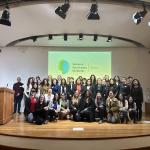From The New York Times:
Judge Rejects Google’s Deal to Digitize Books
By Miguel Helft
Google’s ambition to create the world’s largest digital library and bookstore has run into the reality of a 300-year-old legal concept: copyright.
The company’s plan to digitize every book ever published and make them widely available was derailed on Tuesday when a federal judge in New York rejected a sweeping $125 million legal settlement the company had worked out with groups representing authors and publishers....
Some longtime opponents of the settlement hailed the decision, saying that they hoped it would prompt Congress to tackle legislation that would make orphan works accessible.
“Even though it is efficient for Google to make all the books available, the orphan works and unclaimed books problem should be addressed by Congress, not by the private settlement of a lawsuit,” said Pamela Samuelson, a copyright expert at the University of California, Berkeley [and professor in the School of Law and the School of Information] who helped organize efforts to block the agreement....
From The Chronicle of Higher Education:
Judge Rejects Settlement in Google Books Case, Saying It Goes Too Far
By Jennifer Howard
The proposed settlement in the long-standing class-action lawsuit over Google's vast book-scanning project is dead, at least in its current form. In a ruling on Tuesday, the federal judge overseeing the case rejected the settlement, saying that it "would simply go too far," even though "the digitization of books and the creation of a universal digital library would benefit many." But he also urged the parties to consider revising the settlement, and suggested an approach that would deal with his major concerns....
Judge Chin also raised doubts about how fully the named plaintiffs represented the larger class of authors and publishers who would be covered by the settlement. He pointed to "the substantial question" of "antagonistic interests between named plaintiffs" and other authors and publishers.
"The academic-author objectors, for example, note that their interests and values differ from those of the named plaintiffs," the judge said. He went on to quote from a statement submitted by Pamela Samuelson, a professor of law [and information] at the University of California at Berkeley, who wrote that academic authors "are committed to maximizing access to knowledge," while the plaintiffs "are institutionally committed to maximizing profits."...
From The San Jose Mercury News:
Judge rejects settlement in Google plan to digitize books
By Brandon Bailey
A federal judge dealt a severe blow Tuesday to Google's plans for making millions of out-of-print books available online, part of an ambitious plan to create the world's biggest digital library, after concluding that a tentative legal settlement was anti-competitive and unfair to some authors.
U.S. Circuit Court Judge Denny Chin cited a litany of objections to the proposed settlement of a 2005 class-action lawsuit by major book industry groups, which raised groundbreaking issues of technology and copyright law. At the same time, he acknowledged the social value of what Google co-founder Sergey Brin has called an effort to "unlock the wisdom" of countless authors whose works are no longer widely distributed....
The ruling was applauded by the Justice Department, which had opposed the tentative deal on several grounds, including antitrust concerns. Other critics praised the judge for rejecting a plan they viewed as sharply contradicting the nation's copyright laws.
"That's what copyright law stands for. Nobody gets to use your work without your permission," said Pamela Samuelson, a UC Berkeley professor of law and information management who argued against the pact in a letter to the judge last year....
This story also appeared in The Contra Costa Times.
From Inside Higher Ed:
Please Refine Your Search Terms
By Steve Kolowich
Google says that by scanning and enabling digital access to millions of books from research library collections, it will give students, researchers, and others unprecedented power to search and discover within digital archives.
But now that a federal appeals court judge has rejected a proposed settlement that took years of haggling with authors and publishers to formulate, the company has some searching of its own to do. Google will have to discover a different way to secure the rights to grant access to out-of-print “orphan works” before it can start licensing them for public consumption through its controversial Google Books project, Judge Denny Chin said in a decision handed down Tuesday....
But in a 48-page decision light on references to libraries, students, and research, Judge Chin, of the U.S. Court of Appeals for the Second Circuit, appeared to find most persuasive among the academic petitioners Pamela Samuelson, a law [and School of Information] professor at the University of California at Berkeley, who wrote a brief in early 2010 on behalf of 80 professors in objection to the proposed settlement.
Samuelson had argued that it would be inappropriate for Google and the publishers to profit from the use of orphaned scholarly works -- which she believes comprise a disproportionately large number of the orphans -- when the academics who wrote them probably intended that they be as freely accessible as possible. “Many academic authors … would prefer that orphan books be treated on an ‘open access’ or ‘free use’ basis rather than one where they would be controlled by one private entity,” Chin wrote in a footnote, citing Samuelson's friend of the court brief.
The judge also cited the Berkeley law professor in noting that when Google began scanning collections at large research libraries in 2004, it did not state any intent to sell access to those books later -- a purpose that would have set off copyright-infringement alarms if it had been made explicit. “The Google Book Search initiative envisioned in the [agreement] is not a library,” the judge wrote in another footnote, quoting Samuelson directly. “It is instead a complex and large-scale commercial enterprise in which Google -- and Google alone -- will obtain a license to sell millions of books for decades to come.”...









